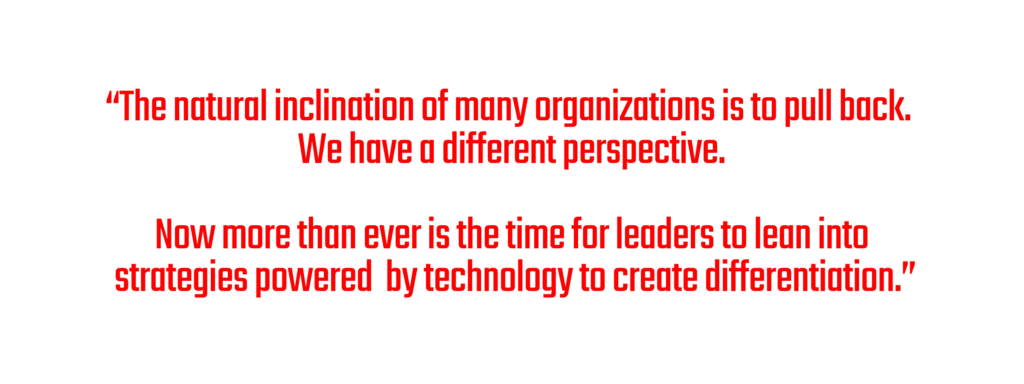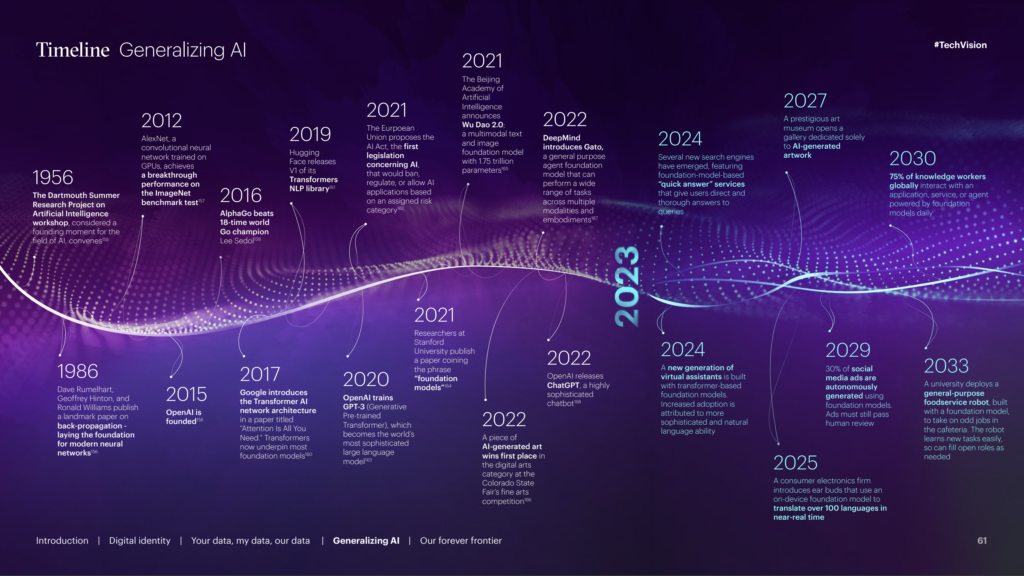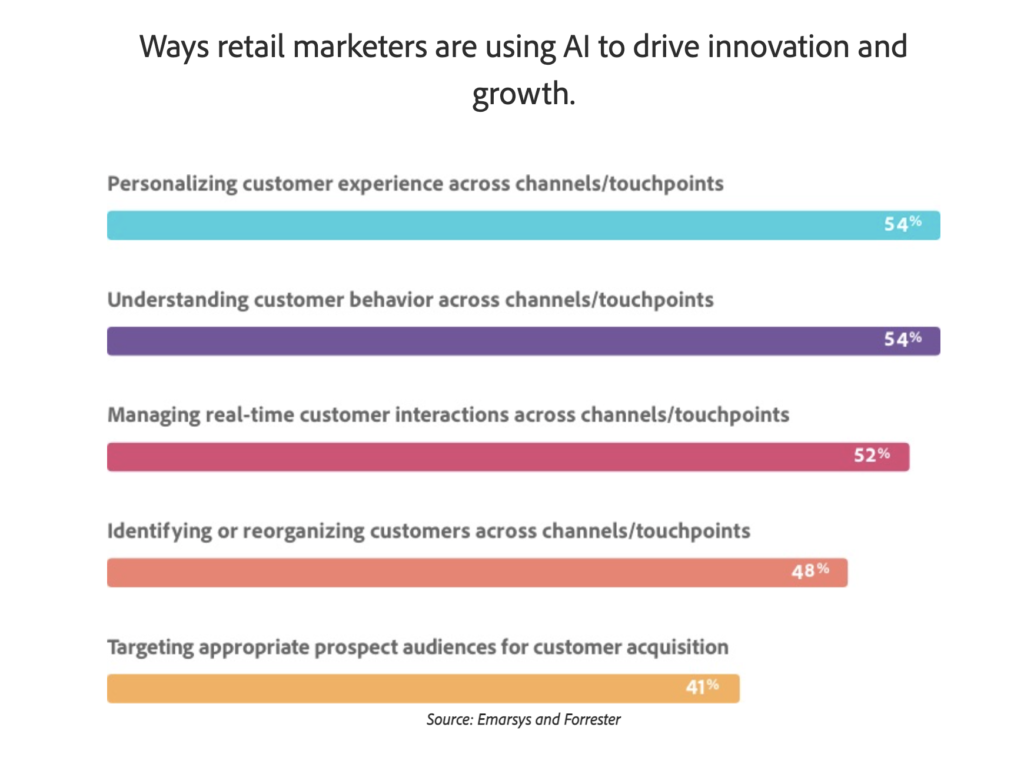8 Ways Retailers Can Use AI to Grow Their Business

That was a takeaway Accenture wanted to impress on readers of i’s latest Technology Vision 2023 report.
Here are three more highlights from the report:



Of course, the “technology” and “models” Accenture refers to are the impact that AI (and services like ChatGPT) will have on all businesses, including retail.
In an ever-growing digital landscape, one of the hottest retail topics is how to leverage generative AI technologies to benefit customers and increase profits. As e-commerce platforms rapidly expand and more physical stores move online, AI-powered systems have become increasingly popular among store owners looking for ways to optimize customer experience while staying ahead of the competition.
From creating product recommendations tailored to each shopper’s interests to anticipating customer needs without manual input, many retailers are turning toward generative AI tools as a solution.
So what exactly can businesses learn from this technology, and how can they use it in their retail context? First, let’s examine some of the most successful uses of generative AI within the industry, enabling startups and long-standing retailers to find solutions for their customers’ shopping needs.
HOW TO USE GENERATIVE AI IN A RETAIL CONTEXT
As retail changes in the digital age, there is an increasing demand to utilize artificial intelligence (AI) technology to maximize sales and stay competitive.
Generative AI—an advanced form of Artificial Intelligence based on machine learning algorithms—is used to streamline operations effectively, drive revenue, and help retailers better understand their customers.
Here are eight ways AI and services like ChatGPT are used in retail to automate labour-intensive tasks and personalize customer experiences.
1 – Fraud Detection and Loss Prevention
- Self-Checkout: AI is revolutionizing the self-checkout experience, offering a secure way to shop and cutting down on potential theft. With autonomous scanning capabilities and heightened customer control, shoppers can enjoy greater autonomy while retailers gain access to data sets that will help identify suspicious behaviour.
- Tracking In-Store Activities: As shopping assistance reduces, retailers must find new ways to guarantee in-store security. Cutting-edge AI technology like computer vision systems can detect any suspicious activities and immediately alert staff members so they may take the necessary actions. These methods help protect customer safety and a store’s reputation, ensuring their visitors will be secure while browsing the shelves.
2 – Store Layout
- Tailored Store Layouts to Maximize Sales: Researchers at the Queensland University of Technology recently released a study demonstrating how retailers could embrace AI to serve customers better.
In the study, researchers identified new ways Artificial Intelligence, combined with in-store cameras, could help tailor store layouts to maximize sales.
To quote from the study:


Customer Dwell Time: To remain competitive, global retailers use AI technology and video analytics to measure two customer engagement metrics: dwell time (minutes a person stands at an aisle or shelf) and gaze time (minutes a person looks at an item). With this data, stores can optimize their strategies for convincing customers to add more products to their carts- resulting in higher profitability. By tracking these critical moments of customer interaction with store items, companies also gain valuable insights into how they can further increase conversion rates.
3 – Dynamic Pricing
- With dynamic pricing, product prices are constantly in flux to ensure optimal value for customers and businesses alike. This innovative strategy is changing the way goods and services are priced today.
For smaller retail companies looking to gain an edge over the competition, dynamic pricing offers a unique strategy for increasing market share and revenue. By carefully defining business goals from the start, this technology can become a powerful instrument in achieving them – provided thorough planning is put into developing the right approach. The result? Real-time adjustment of product prices that help you stay ahead while maximizing your bottom line profits.
4 – Finding The Right Product Placements
- For retailers, the arduous task of manual shelf audits has been a long-standing source of headaches (of course, our sister company Canada’s Best Merchandising Services can help you with this!). Planograms prove to be just as inefficient in determining precise quantities and proper placement for products on store shelves – rendering these methods time-consuming and often inaccurate.
Retailers now have a valuable tool in the form of AI software, which can assist them with product placement and demand. With image recognition and object detection capabilities, retailers can quickly assess shelf conditions while determining the correct prices for each item.
This real-time information enables store staff members to make smarter decisions regarding inventory management; if needed, they can even discontinue certain products that aren’t selling well. What’s more impressive is how this technology notifies personnel when planogram compliance or on-floor availability starts dropping – it knows precisely when shelves become empty!
5 – Personalization
- According to Adobe, here’s just one-way retailers can use AI and machine learning to personalize the shopping experience:
“Retailers are using AI and machine learning to automatically identify the high-value customers who generate the vast majority of revenue, then use it to deliver high-performance loyalty experiences. At the same time, retailers can efficiently and effectively engage lower-value customers, plus identify who’s most likely to become high value over time.”

6 – Marketing Content Creation
While marketing teams should embrace what this technology can do for them – human creativity is still irreplaceable. AI-assisted marketing tools give teams massive leaps in efficiency and the ability to stay competitive. In short, AI tools now create content ten times faster – but is it great content? That remains to be seen.
7 – Customer Service, Experience, and Satisfaction
- Chatbots: Chatbots provide shoppers with an effortless and personalized experience, quickly giving them product recommendations that suit their preferences. This shows consumers that stores appreciate their time by making shopping easier than ever before.
By utilizing chatbots, businesses can acquire invaluable customer data – allowing them to tailor each interaction for personalization that can nurture trust between customers and retailers. Rather than a one-size-fits-all approach, the next time your customers interact with you, they’ll benefit from an experience crafted just for them.
- Virtual Try-ons: As online competition intensifies, savvy retailers are turning to virtual try-on technology to give customers an interactive shopping experience. These technologies allow shoppers to see how products look on them without needing physical in-store fittings, upload photos, and select which items they wish to virtually “try on”. The customer response has been overwhelmingly positive – indicating that these innovative solutions may give businesses an edge over their competitors.
- Collaborative Product Design: Some retailers collaborate with customers through AI to crowdsource the product design process. AI allows retailers to gain valuable insights into customer preferences, enabling them to create customized and innovative designs. Through AI-powered tools such as virtual labs, retailers can provide customers with a platform to experiment with different fabrics, colours, and styles, helping them to bring their vision to life. Moreover, AI technology provides retailers with real-time feedback, allowing them to make necessary changes quickly, resulting in more satisfied customers.
- Frictionless Retail: This cutting-edge method aims to create a seamless shopping experience without requiring human interaction. With frictionless retail, customers can enter a store, pick the items they want, and pay via an AI-powered mobile app. From there, they walk out without the need for any checkout lines or cashiers.
This innovative approach saves customers valuable time and enables retailers to reduce overhead costs and increase their overall efficiency. As a result, frictionless retail is quickly becoming a game-changer in the retail industry, providing customers with a convenient and enjoyable shopping experience like never before.
Here’s a video that shares how frictionless retail is changing the brick-and-mortar experience.
8 – Supply chain optimization & cost reduction
- By leveraging data-driven decisions and automating mundane tasks such as delivery tracking, AI enables workers in this sector to take on more meaningful roles – with greater ease than ever. These advances could be a turning point for both employees and businesses alike.
AI-driven insights offer retailers the unprecedented ability to anticipate consumer needs and stock their shelves accordingly. With efficiency top of mind, these technologies can detect emerging trends in seasonal items or alert businesses when best-selling products may reach critically low levels – ensuring customers always get desired goods. At the same time, healthier profit margins are also maintained.
HOW RETAILERS ARE USING AI IN THE REAL WORLD – USE CASES
Expedia
“Trip planning site Expedia this week launched an AI-based tool on its mobile app that helps users plan voyages and research their destinations.
“Basically the idea is just to give travelers, however they want to shop, the best ways to plan, the best ways to shop, the best ways to find the right thing for them,” Expedia Group CEO and vice chairman Peter Kern told CBS News.
“You can ask [the chatbot] whether April is a good time to go to Paris, or what you might see in Tokyo if you go in March — and can you see the cherry blossoms,” he added.”
Source: https://www.cbsnews.com/news/expedia-chatgpt-travel-planning-app/
Carmax for Marketing
“One company taking advantage of this is CarMax. CarMax is using GPT-3, a large language model and predecessor to GPT-4, to improve the car-buying experience.174 Knowing that there’s a massive amount of information potential car buyers may want to read through before making a purchase decision, CarMax used Microsoft’s Azure OpenAI Service to access a pretrained GPT-3 model to quickly read and synthesize over 100,000 customer reviews for every vehicle make, model, and year that they sell. From these reviews, the model generated 5,000 easy-to-read summaries—a task that CarMax said would have taken its editorial team 11 years to complete.”
Shopify Magic
“High-quality, compelling product descriptions can now be created in seconds, helping you save time, sell more, and get your products in front of even more shoppers.”
Source: https://www.shopify.com/blog/ai-product-descriptions
Carmax (again) for Automated Vehicle Assessments
“It is partnering with UVeye on automated vehicle assessment technology through AI-enhanced condition reports for wholesale buyers of vehicles sold at auction.”
Instacart and ChatGPT for its Recipe Builder & Shopping Lists
“The Instacart ChatGPT plugin works best in helping people figure out what they’d need to make a particular meal or recipe, and helps them account for ingredients they may already have at home or specific dietary restrictions, create an instant shopping list, and get ingredients delivered to their door so they can start cooking. In the future, we’ll be rolling out new capabilities, like the ability to help people shop recipes or ingredients that are on sale or in season.”
Source: https://www.instacart.com/company/updates/instacart-chatgpt/
Carrefour Tests ChatGPT as Grocers Tap AI to Boost Efficiency
“The multinational grocery giant, which has nearly 14,000 stores across more than 30 countries, is leveraging the chatbot and a computer-generated human avatar to reduce the labour cost of creating customer-facing videos.”
Walmart – AI is Embedded Everywhere
“Over the past six years, Walmart has gone from a handful of in-house data scientists to hundreds, according to Srini Venkatesan EVP, U.S. Omni Tech at Walmart Global Tech. These data scientists serve on teams related to supply chain forecasting, optimization and labour/demand planning; search and personalization; as well as emerging technologies.”
Source: https://venturebeat.com/ai/ai-is-embedded-everywhere-at-walmart/
Conclusion
AI-powered chatbots are a great way to automate tedious tasks and create seamless customer experiences. Retailers that can work to experiment, test, and implement these emerging technologies stand to benefit from using AI extensively – now is the time to plan your next steps.
If you want insight into improving the retail shopping experience in your brick-and-mortar stores, contact our team for a project plan and quote that best aligns with your goals.
Investing in AI integration will undoubtedly provide long-term returns as customers’ expectations become increasingly elevated over time – don’t miss out on this evolution.

